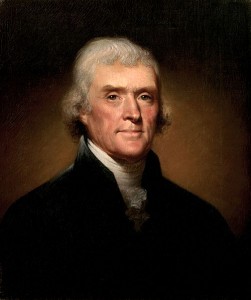Were These U.S. Presidents Really Humanists?

By Steve Major
How many humanist presidents have there already been? Officially, zero.
All 44 United States Presidents have claimed, in one form or another, to be Christian. Alas, even during the era of our nation’s founding fathers, in which reason was held up as one of mankind’s highest ideals, the voting public has largely agreed that electing a non-theist would be morally identical to raising Osama bin Laden from the dead and proclaiming him our emperor.
What may surprise our zombie-averse voting public is that there have been a number of U.S. presidents who have toed the line on religiosity closely enough that historians now wonder if they should be more accurately classified as humanist.
There are two categories under which a president could be better labeled a humanist:
- If their stated branch of Christianity is so vague and all-encompassing that by modern standards it barely counts as a religion at all.
- If there is evidence that the only time they paid any attention to their faith was when talking about it on the campaign trail.
George Washington, Thomas Jefferson, James Madison, James Monroe, and John Tyler did not explicitly self-identify as deists; but there’s good reason to think that to greater or lesser extents, that’s what they were (Jefferson in particular, who famously rewrote the bible to take out all the magic parts).
Deism, for those not up on their colonial religious fads, is a hands-off interpretation of religion, the foundation of which is that God created the Heavens and Earth, and then sat back to see what would happen without interfering much or at all beyond that. A deist would probably have thought evolution made perfect sense: God invented the little microbes that started it all and then spent eternity taking notes on us for his doctoral thesis.
That being said, many of our deist presidents, even if they didn’t have much use for an unhelpful God, did still mostly see the appeal of religion as a social adhesive, and many, like George Washington, went to church regularly.
The French, by the way, who were inspired to have their revolution after seeing how awesome ours was, took that notion even further. They disallowed religion in its previous form, and replaced it with “The Church of Reason” which was mostly an excuse to mandate that everyone get together once a week (which was stretched out, bizarrely, into ten days rather than seven) to lecture the populous about how great their new government was. Many historians consider that to have been a crucial element in the failure of French democracy to take hold, and led to the rise of Emperor Napoleon (who was a fascist, but not a zombie). Contrary to the insane ramblings of certain political figures, the Church of Reason was the failed result of the French Revolution, not the cause of it.
The other branch of Not-Quite-Christian that’s been popular with presidents is Unitarianism. Also known as, or virtually identical to, Universalism, this religion requires only that its adherents have faith in a “higher power” of some kind, preferably, but not necessarily, of the Abrahamic tradition.
Some Unitarian churches narrows it down to anyone who believes in Jesus; but it pretty solidly boils down to “God loves you; follow the golden rule.”
There are plenty of U.S. presidents who never talked about their religion except in a political context. Herbert Hoover and Richard Nixon were both officially Quaker….supposedly. James Madison; James Monroe; William Henry Harrison; John Tyler; Zachary Taylor; Andrew Johnson; Ulysses S. Grant; Rutherford B. Hayes; and Chester Arthur have all had their commitment to religion called into question by various historians to one degree or another.
Our current president, Barack Obama, has been frequently accused of being a secular socialist. As a secular socialist myself, that seems like a pretty tame insult, but a significant majority of the populous takes the claim very seriously, and Obama has taken repeated pains to deny it. He’s was also a member of the United Church of Christ for twenty years before finally quitting in 2008 over the whole Jeremiah Wright mishigas.
Comedian Bill Maher likes to claim that Obama is a closeted atheist who made a calculated decision twenty years ago to join a church in anticipation of placating the zombie-hating voters of America. When both the Left and Right accuse someone of being a secret atheist, it does raise a few eyebrows. But then again, the Right has also accused him of being a Marxist, a Muslim, and a Malaysian Manchurian Candidate; so we should take all that with a grain of salt.
My personal speculation on the topic is that President Obama takes after his political hero Abraham Lincoln in yet another of many ways. Both men spoke out against religious dogma over the course of their pre-political years, both have clearly studied the issue in depth, and both were adept and eloquent in incorporating biblical language into their political speeches.
My guess is that both men would be most accurately classified as deists (which, as we’ve discussed, is one very short step away from humanism). Both embraced the supportive social element of church-going life, and both clearly saw the value and importance that religion holds for most of the country. As for whether they believe in any of the magical bits? We’ll just have to keep speculating.
Steve Major is the development associate for the American Humanist Association.
